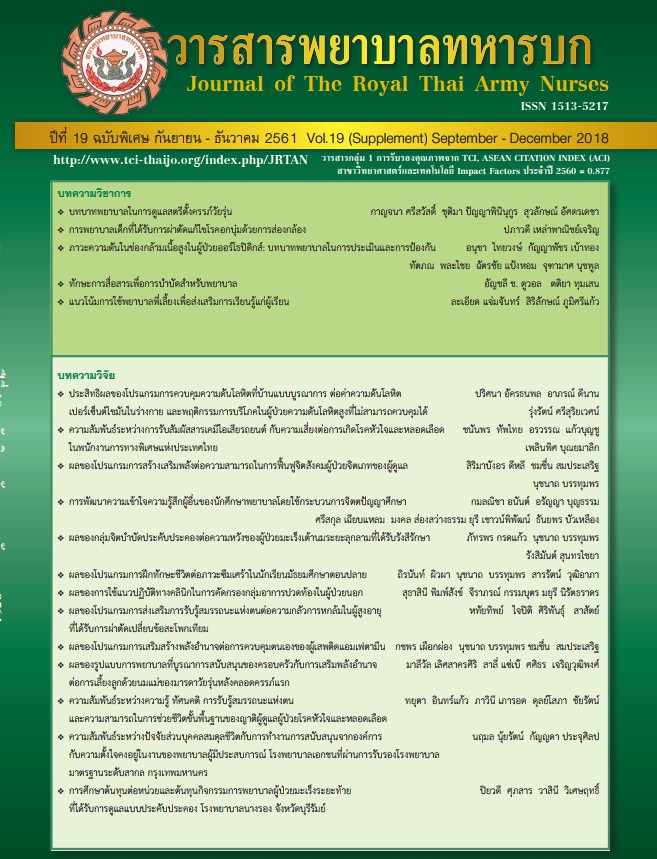The Effect of Family Support Program on Depressive Symptoms in First - Episode Schizophrenic Patients
Keywords:
family support program, first- episode schizophrenic patients, depressive symptomsAbstract
The purposes of quasi-experimental research were: 1) to compare depressive symptoms in firstepisode schizophrenic patients before and after received family support program, and 2) to compare depressive symptoms in first - episode schizophrenic patients who received family support program and those who received regular nursing care. The sample consisted of 40 first - episode schizophrenic patients, receiving services in out-patient department, Galya Rajanagarindra Institute. They were matched-pair by patients’ sex and family income, and, then equally randomly assigned into an experimental group and a control groups. The experimental group received the family support program, whereas the control group received regular nursing care. Research instruments included 1) a nurses’ of the family support program, depression assessment in schizophrenic patients, social support scale, test of caregivers’ knowledge about schizophrenic care. All instruments were content validated by a panel of 5 professional experts. The Cronbach’s alpha coefficient reliability of the depression assessment was .93 Data were analyzed using descriptive statistics and t-test. The research conclusion were:1) Depressive symptoms in first- episode schizophrenic patients after receiving family support program was significantly lower than that before the experiment, at the .05 level. 2) Depressive symptoms in first- episode schizophrenic patients after receiving family support program was significantly lower than those who received regular nursing care, at the .05 level.
Downloads
References
2. Galya Rajanagarindra, Institute of Medical Records. Annual Report. Bangkok: Institution. Galya Rajanagarindra; 2018. (in Thai)
3. Luebunthawatchai O. Mental health and psychiatric nursing .Bangkok: Printing of Chulalongkorn University; 2013. (in Thai)
4. Hafner, H. The early course of schizophrenia and depression. European Archives of Psychiatry and Clinical Neuroscience.2005;255(1):67-73.
5. Kesschai S . Predictors of depression in schizophrenic patients with mental illness. Master of Nursing Science Mahidol University; 2012. (in Thai)
6. House, J.S.; Kahn, R. L.; McLeod, J. D., Williams, D., Cohen, S., & Syme, S. L. Messures and concepts of social support. Social Support and Health. 1985; 83-108.
7. House, A., Bostock, J., & Cooper, J. (1987). Depressive symdromes in the year following onset of a first Schizophrenic illness. The British Journal of Psychiatry 1987; 151: 773-779.
8. House.J.S. et al. Social support occupational stress and health.Journal of Health and Social Behavior 1981; 21:202-218.
9. Beck, A. T., Rush, A. J., Shaw, B.F., & Emery, G. Cognitive therapy of depression. New York: The Guilford Press;1979.
10. Addington, D. Specificity of the Calgary Depression Scale for schizophrenics. Schizophrenia Research 1993; 39-44.
11. Rakman J. Effects of mental health education programs on the burden of care for schizophrenic patients in the community. Thesis Master of Nursing Science, Chulalongkorn University; 2016. (in Thai)
12. Chuchuen U. Effect of group therapy program on self esteem among chronic psychiatric Patients.Journal of psychiatric nursing and mental health; 2017.(in Thai)
13. Srimolight S. Therapeutic solutions to depression in adulthood: Empirical evidence-based nursing. Thai Journal of Nursing Council; 2011. (in Thai)
14. Wattanapailin A. An Effect of Coping Skill Traing Program on Depression in Early Adolescents. Journal of Nursing Science; 2011. (in Thai)
15. Panya S. The Effect of Group Interpersonal Psychotherapy on Depression Among Patients with Depressive Disorder. Journal of The Police Nurse; 2015. (in Thai)
Downloads
Published
How to Cite
Issue
Section
License
บทความหรือข้อคิดเห็นใดใดที่ปรากฏในวารสารพยาบาลทหารบกเป็นวรรณกรรมของผู้เขียน ซึ่งบรรณาธิการหรือสมาคมพยาบาลทหารบก ไม่จำเป็นต้องเห็นด้วย
บทความที่ได้รับการตีพิมพ์เป็นลิขสิทธิ์ของวารสารพยาบาลทหารบก
The ideas and opinions expressed in the Journal of The Royal Thai Army Nurses are those of the authors and not necessarily those
of the editor or Royal Thai Army Nurses Association.






